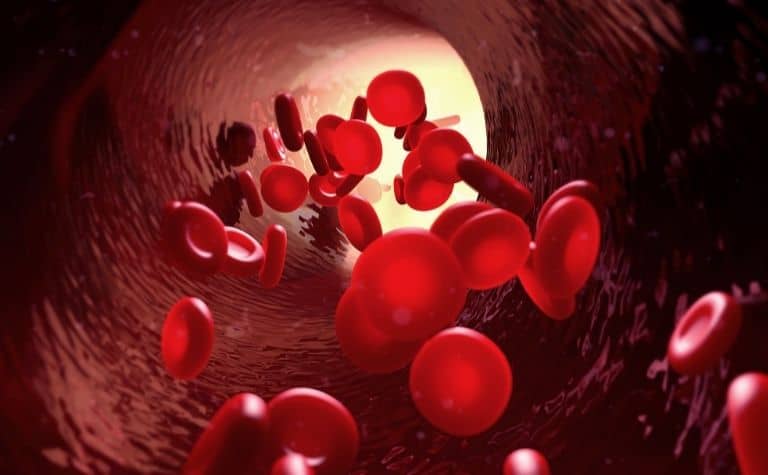The unique nature of Rh-negative blood has a simple scientific explanation to most people. But for some, it’s evidence that an extraterrestrial encounter occurred thousands of years ago, which produced half-human creatures that still live on Earth today.
The Bible never mentions Rh-negative blood. According to one unorthodox modern theory, the Nephilim, who are mentioned in Genesis 6:1-8 and Numbers 13:33 (and may be alluded to elsewhere), have Rh-negative blood. A lot of debate about angels and demons surrounds the interpretation of these mysterious passages.
What’s the difference between Rh-negative blood and Rh-positive blood and what exactly does it have to do with the Nephilim, angels, demons, and aliens? Who are the Nephilim? And related to that question, who are the “sons of god” and the “daughters of men”? Keep reading to learn the answers to these questions and many more.
Also see What Does “Strange Flesh” Mean in the Book of Jude?

Rh-negative blood and Rh-positive blood: proteins, pregnancy, and conspiracy theories
Biblical authors finished writing in the late first century. Blood types were discovered about 1,800 years later, in the early 20th century. The Rh blood group, which includes Rh-negative and Rh-positive, was discovered in 1940.
As the table below shows, the presence of a protein determines Rh blood type. Rh-negative blood can negatively affect pregnancies if it’s not treated. It’s also central to certain conspiracy theories that include the Nephilim.
| Rh-negative blood | Rh-positive blood | |
|---|---|---|
| Protein | doesn’t contain a protein on red blood cells | contains a protein on the surface of red blood cells |
| Inherited from parents | yes | yes |
| Frequency | most common | less common |
| Creates ill effects on health | no | no |
| Can affect pregnancies | no | yes * |
| Basis of conspiracies involving the Bible | no | yes, it’s the blood type of demon-human or alien-human hybrid creatures (more below) |
How does Rh-negative blood affect pregnancies? According to the Mayo Clinic, “Having an Rh-negative blood type is not an illness and usually does not affect your health. However, it can affect your pregnancy.” [1]
If a mother is Rh-negative and her first baby is Rh-positive, there’s a potential danger if their blood mixes. The mother’s first child isn’t at risk, but her second child could be.
Why can’t Rh-negative and Rh-positive blood mix? If a mother with Rh-negative blood absorbs Rh-positive blood, her body would identify it as a foreign invader and develop antibodies against it.
If the mother’s antibodies mixed with her second child’s blood, they would attack and destroy the child’s blood cells. Today, a simple shot, often referred to as an Rh immune globulin injection prevents a mother’s body from producing antibodies.
“Although the Rh-negative trait is rare in most parts of the world, it occurs in about 15 percent of Caucasians in Europe, Canada, and the United States.”
Encyclopedia Brittanica [2]
Also see Is Covid 19 in the Bible? to learn more.

What does Rh-negative blood have to do with the Nephilim?
Bible readers have debated the identity of the Nephilim for nearly three thousand years.
Even renowned Jewish and Christian scholars express uncertainty about the details and meaning of the verses and passages that mention them.
Scholars, historians, rabbis, pastors, and Bible readers have been asking questions like these for thousands of years:
- Were the Nephilim merely human men (and nothing more) at the time of Noah?
- Were they half-human and half-demon?
- If they were half-human, who mated to create them?
- Is it significant that “Nephilim” means “fallen ones”?
- If they are half-human, what are the implications regarding their offspring?
- Are the descendants of the Nephilim still on the earth today?
How does the Bible introduce the Nephilim? The Nephilim are first mentioned in Genesis 6:1-8. Although they aren’t mentioned by name until verse four, the first three verses are central to the debate about their identity.
According to one view, the Nephilim are the offspring of the “sons of god” and the “daughters of men.”
“Now it came to pass, when men began to multiply on the face of the earth, and daughters were born to them, that the sons of God saw the daughters of men, that they were beautiful; and they took wives for themselves of all whom they chose.”
Genesis 6:1-3 (NKJV), emphasis added
There are three common interpretations regarding the identity of the sons of god, the daughters of men, and the Nephilim.
A few scholars nuance one of the three main views and an even smaller number try to combine two of them, but most Bible scholars accept the general framework of one of the three views on the table below.
| View 1 | View 2 | View 3 | |
|---|---|---|---|
| Who are the “sons of god”? | fallen angels, i.e. demons | powerful human rulers, royalty | the godly male descendants of Seth’s line |
| Who are the “daughters of men”? | human women | harems of the human rulers | the godless offspring of Cain’s line |
| What was the sin? | lust; some views argue that the women consented, and others that demons raped them | polygamy | marriage between the godly and ungodly |
| Who are the Nephilim? | the offspring of demons and humans (more below) | famous men (v. 4b) | famous men (v. 4b) |
Also see Are White People In the Bible? to learn more.
Which view relates to Rh-negative blood? Some modern conspiracy theorists believe that Rh-negative blood is found in the descendants described in View 1.
To be clear, no reputable Bible scholar, even among those that hold to the general framework of View 1, believes that people with Rh-negative blood are descendants of the Nephilim.
Arguments in support of View 1:
- Jude 6-7 and 2 Peter 2:4-6 in the New Testament may allude to the story (verses below)
- It’s the traditional view of the passage in Jewish and Christian history
- It’s consistent with the meaning of the word Nephilim, which is “fallen ones”
- The Bible refers to angels elsewhere as “sons of god” (e.g. Job 1:6, see below)
- There are several examples of historic Jewish exegesis that hold this view, including 1 Enoch 6:2 (verse below), Jub. 5:1, the Septuagint (the Greek translation of the Old Testament), the Jewish historian Josephus, and the Dead Sea Scrolls
- Several early Christian leaders like Justin Martyr, Tertullian, and Origen, held this view
Arguments in support of View 2:
- One possible reading of the Hebrew can mean that the famous men (6:4b) were the offspring of the sons of god and daughters of men [3]
- Polygamy is a theme in Genesis, e.g. 4:19
- Human leaders are sometimes referred to as God-like (e.g. Ps. 82)
Arguments in support of View 3:
- It best fits the context of global judgment
- The flood is God’s judgment against people, but it doesn’t mention demons or hybrid creatures as the target
- Some important Christian theologians have held this view, including Augustine and Martin Luther
What is the majority view among scholars in history? As strange as it may seem to modern readers, many reputable Jewish and Christian scholars believe that the human-demon hybrid interpretation is correct.
For example, in what is widely considered the best Genesis commentary available today, the author concludes, “It seems that the sons of the gods must be understood as spiritual beings akin to angels or demons.” [1]
However, even though the majority of scholars hold View 1, none of them contend that the offspring have Rh-negative blood. Furthermore, scholars argue that God destroyed the Nephilim thousands of years ago.
Also see What Does the Bible Say About Astrology? to learn more

Nephilim in the Bible
To many scholars, the unusual nature and intensity of the sin in Genesis 6:1-4 explains God’s regret (v. 6) and the flood of judgment that follows in the narrative.
The flood narrative makes clear that the judgment waters destroyed everyone and everything on the earth, except for those in the ark (e.g. Gen. 7:11). In other words, God destroyed the Nephilim.
Did the Nephilim survive the flood, contrary to Genesis’s reporting? Those who believe that the descendants of the Nephilim exist today do so in defiance of what Genesis records.
However, some point out that the word “Nephilim” is also mentioned in the post-flood narrative of Numbers 13:33, “There we saw the giants (the descendants of Anak came from the giants); and we were like grasshoppers in our own sight, and so we were in their sight.” (NKJV)
How is this explained?
- Did the Nephilim survive the flood?
- Did fallen angels return to Earth and mate with people again after the flood?
- Is the author of Numbers exaggerating his description of an unusually tall people group who intimidated the Israelites?
There are scholars that take each of these views. Most Bible scholars believe that God destroyed the Nephilim in the flood and that the description of Nephilim in Numbers 13:33 is an exaggeration.
In support of this interpretation is that hyperbole is used to describe the Israelites as “grasshoppers” in the second half of the verses.
Also see Can You Go to Heaven with Tattoos? to learn more
Nephilim as aliens
Some unorthodox modern-day theories, though not endorsed by any reputable Bible scholar, posit that the creatures Genesis calls “sons of god” are aliens from advanced, extraterrestrial civilizations.
The Nephilim, according to this theory, are not human-demon hybrids but human-alien hybrids. Aliens not only mated with women but generated a race of human-alien offspring that still live on Earth.
According to the theory, ancestors of this hybrid race have Rh-negative blood and often exhibit unusual intelligence and abilities.
Are the Nephilim mentioned in the New Testament?
Jude 6-7: “And the angels who did not keep their proper domain, but left their own abode, He has reserved in everlasting chains under darkness for the judgment of the great day; as Sodom and Gomorrah, and the cities around them in a similar manner to these, having given themselves over to sexual immorality and gone after strange flesh, are set forth as an example, suffering the vengeance of eternal fire.” (NKJV)
2 Peter 2:4-6: “For if God did not spare the angels who sinned, but cast them down to hell and delivered them into chains of darkness, to be reserved for judgment; and did not spare the ancient world, but saved Noah, one of eight people, a preacher of righteousness, bringing in the flood on the world of the ungodly; and turning the cities of Sodom and Gomorrah into ashes, condemned them to destruction, making them an example to those who afterward would live ungodly.” (NKJV)
Job 1:6: “Now there was a day when the sons of God came to present themselves before the Lord, and [e]Satan also came among them.” (NKJV)
The Nephilim in 1 Enoch
1 Enoch 6:2: “And the angels, the children of the heaven, saw and lusted after them, and said to one another: ‘Come, let us choose us wives from among the children of men and beget us children.” [4]
Please see related articles below
References:
[1] Source
[2] Source
[3] Genesis by Gordon Wenham. Word Biblical Commentary. P. 146.
[4] Source
Related Articles
Does the Bible Talk About Aliens and UFOs? (Assess the Claims)
As the History Channel's series Ancient Aliens demonstrates, alleged encounters between people and extraterrestrials are popular stories, even if most people like them for entertainment value as...
The description "strange flesh" in Jude 1:7 has two common interpretations among Bible scholars. Each interpretation is controversial in the 21st century. Both views attempt to explain the sexual...
